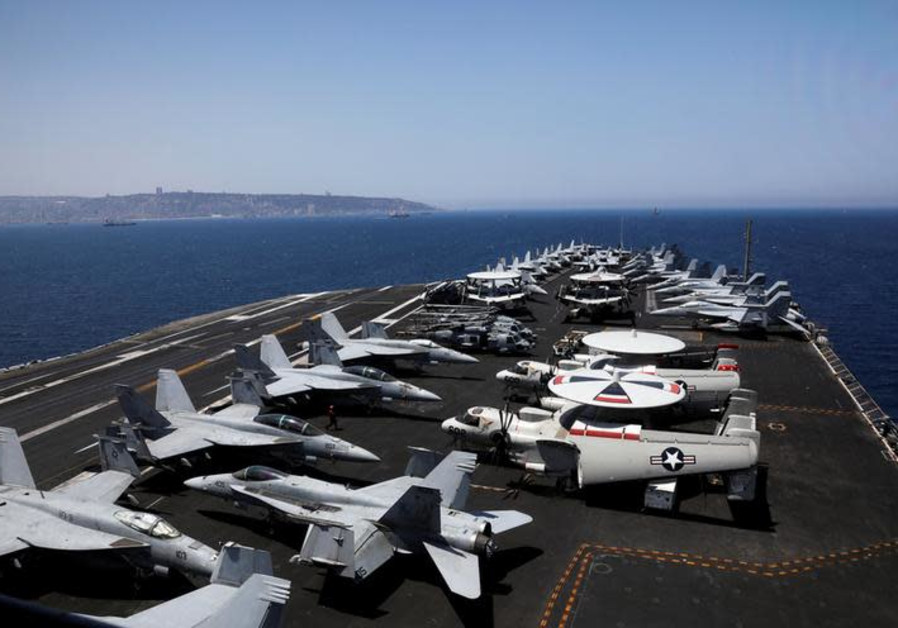Ex-national security advisor to ‘Post’: Israel needs to review China deals

A general view shows the dock of the U.S. aircraft carrier USS George H. W. Bush, as it docks at Haifa port, Israel July 3, 2017. (photo credit: REUTERS/Ronen Zvulun)
In news stories that were scarcely noted last year, Prof. Avi Shimhon, Prime Minister Benjamin Netanyahu’s top economic advisor, and Meir Ben Shabbat, Israel’s National Security Advisor, were reportedly instructed to develop a mechanism to assess the threat of strategic investment by external actors in Israel’s critical infrastructure. Their task was described as a run-of-the-mill bureaucratic one. But it was clear that Israel’s leadership was reassessing foreign strategic investment in the state, including Chinese plans for the reconstruction and operation of the state’s largest seaport in Haifa.
This move was long overdue. The decision to work with China on the Haifa port has already rankled US decision makers and has reportedly alarmed the Pentagon. Indeed, there are rumors that the US Navy may no longer dock its vessels in Haifa if the China deal goes through.
China is one of the Pentagon’s top concerns these days. Beijing has global ambitions. In addition to its increasing activity on the South China Sea, it has launched new economic and political initiatives like One Belt One Road, which is designed to grant the Chinese a foothold in countries stretching from central Asia all the way to the Levant. Furthermore, Israel’s critical infrastructure programs and facilities have become important to China in recent years.
The Haifa port is not the only target. China also has its eyes on the port of Ashdod, the underground tunnels and control systems in the northern Carmel mountains, Tel Aviv’s underground tunnels and their control systems, and Israel’s public transportation system.
The strategic importance of this infrastructure cannot be overstated, given that some of it runs alongside key military installations, major businesses, food suppliers, and more.
Public transport may be the most sensitive, given that thousands of cameras, sophisticated communication equipment, and emergency services are all connected to one central hub that could be accessed or even controlled by China, if a deal is consummated.
Chinese companies have also put Israeli companies in their crosshairs. For example, there were attempts to acquire the insurance giant Phoenix, and a major Israeli civilian communication satellite company.
It was slow to emerge, but there is now a healthy debate in Israel about the tensions between enhancing the economy and the possible deleterious impact of allowing China or other international actors to have a hand in the country’s strategic infrastructure.
It’s hard to understand how Israeli decision makers did not see how a Chinese strategic investment in the Haifa port or the Tel Aviv underground tunnels could be dangerous to Israel’s security, how it could create friction with Israel’s most important ally, or how it could provide ammunition to Israel’s vociferous detractors.
The answer is actually quite simple. Until recently, investment in major civilian infrastructure was not viewed as a national security concern or even a diplomatic issue. Under the current regulatory status, these issues don’t even reach the relevant decision makers because they are not categorized as defense and security related issues. The relevant Ministries, like the Ministry of Transportation (for the Haifa port case), are making the decisions from their very narrow point of view. This is a failing in the Israeli bureaucracy system and a challenge that Israeli leadership will hopefully address.
It’s a challenge that other countries, including the US, have also been slow to tackle. The recent changes to the Committee on Foreign Investment in the United States (CFIUS) was overhauled by new legislation passed in August, the Foreign Investment Risk Review Modernization Act (FIRRMA). This is expected to alter US policy on Chinese strategic investment in ways that Washington has failed to implement until now.
Decision makers in Israel do not need new legislation, but they now understand that strategic investment is a strategic challenge and must be met with proactive policies. This is an issue that cannot be decided upon by bureaucrats responsible for the infrastructure development only. It must be handled directly by those who view the defense and security space as crucial. It should be handled directly by an inter-agency regulatory committee headed by the Prime Minister’s Office (NSA+DG), with participation from all relevant players. This committee should have real licensing authorities and not merely recommendation from the authorities.
Outside investment is crucial for the health of the Israeli economy, but not if it comes at the expense of the country’s security or the country’s most important ally.
The writer is the former Israeli acting National Security Advisor. He is now a Visiting Professor at the Aerospace faculty, Technion-Israel Institute of Technology in Haifa and a visiting fellow at the Foundation for Defense of Democracies.
Join Jerusalem Post Premium Plus now for just $5 and upgrade your experience with an ads-free website and exclusive content. Click here>>






Comments are closed.